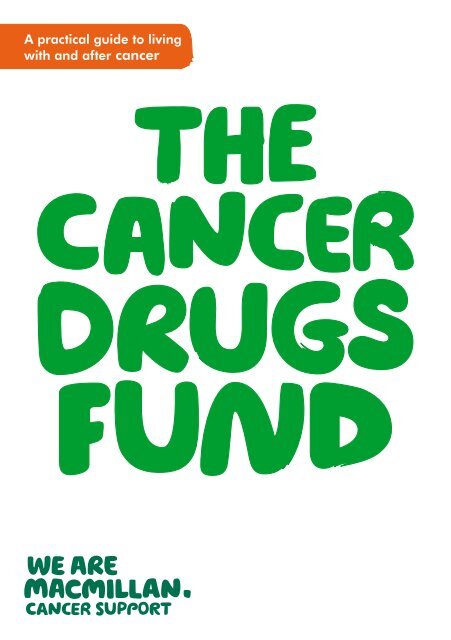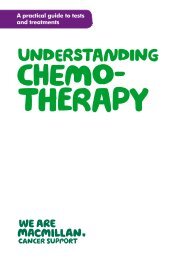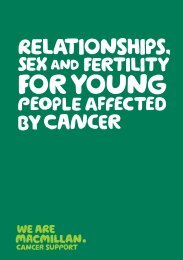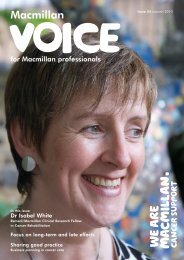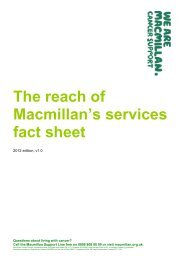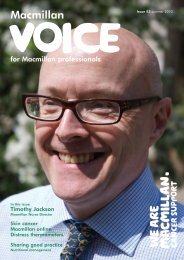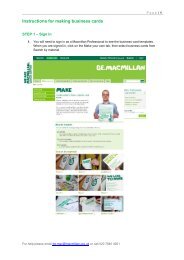Cancer drugs fund - Macmillan Cancer Support
Cancer drugs fund - Macmillan Cancer Support
Cancer drugs fund - Macmillan Cancer Support
Create successful ePaper yourself
Turn your PDF publications into a flip-book with our unique Google optimized e-Paper software.
A practical guide to living<br />
with and after cancer
If you haven’t been able<br />
to access a particular<br />
drug that would help<br />
control your cancer,<br />
the <strong>Cancer</strong> Drugs Fund<br />
could help.<br />
This leaflet looks at:<br />
• why the <strong>Cancer</strong> Drugs Fund was created<br />
• what happens if a treatment is on the list<br />
of approved <strong>drugs</strong><br />
• what happens if a treatment isn’t on the list<br />
of approved <strong>drugs</strong><br />
• how <strong>fund</strong>ing decisions are made<br />
• how to appeal if your application for <strong>fund</strong>ing<br />
is denied<br />
• your feelings about being able to access<br />
a particular treatment.<br />
The <strong>Cancer</strong> Drugs Fund 2
What is<br />
the <strong>Cancer</strong><br />
Drugs<br />
Fund<br />
The <strong>Cancer</strong> Drugs Fund is a special<br />
<strong>fund</strong> worth £200 million a year. It was<br />
established in 2010 to help improve<br />
access to cancer <strong>drugs</strong> for people living<br />
in England. The <strong>fund</strong> ends in March 2014.<br />
The governments of Scotland, Wales and<br />
Northern Ireland decide separately how<br />
they spend their money on health and do<br />
not have similar schemes.<br />
The <strong>fund</strong> is for cancer <strong>drugs</strong> that aren’t<br />
routinely available on the NHS. These<br />
are usually <strong>drugs</strong> that have been shown<br />
to work for your type or stage of cancer,<br />
but have not been evaluated or<br />
recommended for routine use by the<br />
National Institute for Health and Care<br />
Excellence (NICE). This is the organisation<br />
that sets clinical guidelines.<br />
Since April 2013, there has been a national<br />
list of cancer <strong>drugs</strong> that are approved<br />
for <strong>fund</strong>ing by the <strong>Cancer</strong> Drugs Fund.<br />
But applications can also be made for<br />
<strong>drugs</strong> not on this list.<br />
The <strong>fund</strong> doesn’t replace existing <strong>fund</strong>ing<br />
processes and is only available after<br />
all other sources of NHS <strong>fund</strong>ing have<br />
been explored.<br />
The <strong>Cancer</strong> Drugs Fund 3
Am I eligible<br />
for <strong>fund</strong>ing<br />
List of<br />
approved<br />
<strong>drugs</strong><br />
To begin with, it’s important to talk to your<br />
cancer specialist. You can both decide<br />
which treatment is best for you by openly<br />
discussing all possibilities. This will depend<br />
on a number of things, like the type of<br />
cancer you have, its stage, any other<br />
treatments you’ve had, what the side effects<br />
are likely to be, and any other medical<br />
conditions you have.<br />
You must live in England to apply for<br />
the <strong>fund</strong>.<br />
If you and your cancer specialist agree that<br />
a particular drug is right for you and it is on<br />
the list of <strong>drugs</strong> approved for <strong>fund</strong>ing from<br />
the <strong>Cancer</strong> Drugs Fund, your specialist will<br />
be able to apply online. They will usually<br />
receive a response immediately, but it may<br />
take up to two days.<br />
The outcome will still rely on the evidence<br />
provided by your cancer specialist and<br />
details of your individual circumstances.<br />
The list of approved <strong>drugs</strong> is regularly<br />
updated and the <strong>drugs</strong> that are <strong>fund</strong>ed<br />
may change as new <strong>drugs</strong> become<br />
available, or if a new drug is made<br />
routinely available on the NHS.<br />
The <strong>Cancer</strong> Drugs Fund 4
The <strong>Cancer</strong> Drugs Fund 5
Drugs not<br />
on the<br />
approved<br />
list<br />
Some cancer <strong>drugs</strong> aren't on the list of<br />
approved <strong>drugs</strong>. For these, your cancer<br />
specialist, working with local NHS<br />
managers, will look into all reasonable<br />
sources of NHS <strong>fund</strong>ing before applying<br />
to the <strong>Cancer</strong> Drugs Fund on your behalf.<br />
How are<br />
<strong>fund</strong>ing<br />
decisions<br />
made<br />
Your cancer specialist has to apply online to<br />
the NHS England regional team that covers<br />
the area where you are to receive or are<br />
receiving treatment (see page 9).<br />
A panel of medical experts will review<br />
individual requests for <strong>drugs</strong> that aren't<br />
on the approved list.<br />
The panels make <strong>fund</strong>ing decisions<br />
based on:<br />
• the evidence provided by<br />
your cancer specialist<br />
• your individual circumstances<br />
(for example, whether the drug may<br />
improve your quality of life or increase<br />
your chance of surviving your illness)<br />
The <strong>Cancer</strong> Drugs Fund 6
• any evidence about how well the drug<br />
works and the possible side effects<br />
• the cost of the drug.<br />
They may consider applications where there<br />
is limited evidence.<br />
How quickly<br />
are decisions<br />
made<br />
When the panel reviews an application for<br />
a drug not on the approved list, they should<br />
make their decision within 10 working days.<br />
Panels should give a clear reason for<br />
denying <strong>fund</strong>ing for a drug.<br />
Our fact sheet What you can do if a<br />
treatment isn’t available has more<br />
information about how <strong>drugs</strong> are made<br />
available in the UK, and about other<br />
sources of <strong>fund</strong>ing.<br />
The <strong>Cancer</strong> Drugs Fund 7
Can I<br />
appeal<br />
against the<br />
decision if<br />
<strong>fund</strong>ing is<br />
denied<br />
Your cancer specialist can request a review<br />
of the panel’s decision through the regional<br />
medical director. But they can only do this if<br />
they think:<br />
• the panel didn’t make their decision<br />
using the proper process<br />
• the panel didn’t take into account<br />
all of the relevant evidence<br />
and <strong>fund</strong>ing available.<br />
The review panel should make its decision<br />
within five days.<br />
Your cancer specialist can reapply to the<br />
<strong>Cancer</strong> Drugs Fund if:<br />
• there is a change in your condition<br />
that means you’d get more<br />
benefit from the drug, or<br />
• new research is published that<br />
suggests you would get more benefit.<br />
If you have a general complaint about<br />
your treatment, visit our website at<br />
macmillan.org.uk/makingacomplaint<br />
We have a booklet called Making<br />
treatment decisions, which you may<br />
find helpful.<br />
The <strong>Cancer</strong> Drugs Fund 8
How is<br />
the <strong>fund</strong><br />
managed<br />
NHS England has overall responsibility<br />
for managing the <strong>fund</strong>, with four<br />
regional teams carrying out day-to-day<br />
administration using national operating<br />
procedures.<br />
These are:<br />
• North of England<br />
• Midlands and East<br />
• South of England<br />
• London.<br />
Contact details can be found at<br />
www.england.nhs.uk/ourwork/pe/cdf<br />
If you already receive <strong>fund</strong>ing for a drug<br />
that was arranged under the old system of<br />
Strategic Health Authorities, this change<br />
in how the <strong>fund</strong> is managed will not affect<br />
your existing <strong>fund</strong>ing for your medication.<br />
The <strong>Cancer</strong> Drugs Fund 9
Your<br />
feelings<br />
It can be very difficult when a drug that<br />
you and your cancer specialist feel could<br />
benefit you isn’t readily available.<br />
You may feel angry, frustrated and let<br />
down. Dealing with this as well as your<br />
cancer can feel overwhelming.<br />
Having cancer can cause many different<br />
emotions, including anxiety and fear.<br />
These are normal reactions and are part<br />
of the process many people go through in<br />
trying to come to terms with their cancer.<br />
Everybody has their own way of coping<br />
with difficult situations. Some people find<br />
it helpful to talk to friends or family, while<br />
others prefer to seek help from people<br />
outside their situation. Some people prefer<br />
to keep their feelings to themselves.<br />
There is no right or wrong way to cope,<br />
but help is available if you need it.<br />
Our booklet How are you feeling<br />
The emotional effects of cancer looks at<br />
the emotional impact cancer can have,<br />
and explains where you can get advice<br />
and support.<br />
The <strong>Cancer</strong> Drugs Fund 10
The <strong>Cancer</strong> Drugs Fund 11
Further<br />
information<br />
We have more information about<br />
cancer types, tests, treatments<br />
and living with and after cancer.<br />
We also have details of other helpful<br />
organisations and support groups in<br />
your area. You can contact us using<br />
the following details:<br />
<strong>Macmillan</strong> <strong>Cancer</strong> <strong>Support</strong><br />
89 Albert Embankment, London SE1 7UQ<br />
General enquiries 020 7840 7840<br />
Questions about cancer Call free on<br />
0808 808 00 00 (Mon–Fri, 9am–8pm)<br />
Alternatively, visit macmillan.org.uk<br />
Hard of hearing Use textphone<br />
0808 808 0121, or Text Relay.<br />
Non-English speaker<br />
Interpreters available.<br />
For further information<br />
about access to treatment,<br />
visit macmillan.org.uk/<br />
accesstotreatment<br />
To order any of our booklets,<br />
visit be.macmillan.org.uk<br />
or call us on 0808 808 00 00.<br />
The <strong>Cancer</strong> Drugs Fund 12
Useful<br />
resources<br />
The <strong>Cancer</strong> Drugs Fund<br />
www.england.nhs.uk/ourwork/pe/cdf<br />
The Patients Association<br />
www.patients-association.org.uk<br />
Advises patients on their rights and<br />
access to health services.<br />
Patient Advice and Liaison<br />
Service (PALS)<br />
www.nhs.uk<br />
Provides information, advice and local<br />
support to help patients, families and<br />
their carers.<br />
The <strong>Cancer</strong> Drugs Fund 13
Disclaimer<br />
We make every effort to ensure that the information we provide is accurate and<br />
up-to-date, but it should not be relied upon as a substitute for specialist professional<br />
advice tailored to your situation. So far as is permitted by law, <strong>Macmillan</strong> does not<br />
accept liability in relation to the use of any information contained in this publication,<br />
or third-party information or websites included or referred to in it. Some photographs<br />
are of models.<br />
Thanks<br />
This leaflet has been written, revised and edited by <strong>Macmillan</strong> <strong>Cancer</strong> <strong>Support</strong>’s <strong>Cancer</strong><br />
Information Development team. It has been approved by Dr Tim Iveson, Consultant<br />
Medical Oncologist and <strong>Macmillan</strong> Chief Medical Editor.<br />
With thanks to: Donna Hakes, Head of Clinical Effectiveness, Specialised Services,<br />
NHS England; Geoff Heyes, Senior Public Affairs Officer, <strong>Macmillan</strong> <strong>Cancer</strong> <strong>Support</strong>;<br />
Heidi Livingstone, Public Involvement Adviser, Public Involvement Programme,<br />
National Institute for Health and Care Excellence; Margaret Stanton, Head of<br />
Medicines Access, Clinical and Cost Effectiveness, Department of Health; and the<br />
people affected by cancer who reviewed this edition.<br />
Sources<br />
<strong>Cancer</strong> Research UK. <strong>Cancer</strong> Drugs Fund [Online]. Available from: www.cancerhelp.<br />
org.uk/about-cancer/cancer-questions/cancer-<strong>drugs</strong>-<strong>fund</strong> (accessed 21.06.13).<br />
NHS Commissioning Board. Standard Operating Procedures: The <strong>Cancer</strong> Drugs<br />
Fund 2013-14. 2013. Available from: http://www.england.nhs.uk/wp-content/<br />
uploads/2013/03/cdf-sop.pdf (accessed 21.06.13).<br />
The <strong>Cancer</strong> Drugs Fund 14
Notes You can use this page to remind yourself of the<br />
questions you want to ask your healthcare team<br />
and to write down the answers you receive.<br />
The <strong>Cancer</strong> Drugs Fund 15
More than one in three of us will get cancer.<br />
For most of us it will be the toughest fight we<br />
ever face. And the feelings of isolation and<br />
loneliness that so many people experience<br />
make it even harder. But you don’t have to<br />
go through it alone. The <strong>Macmillan</strong> team<br />
is with you every step of the way.<br />
ww<br />
We are the nurses and therapists helping you<br />
through treatment. The experts on the end of<br />
the phone. The advisers telling you which benefits<br />
you’re entitled to. The volunteers giving you a hand<br />
with the everyday things. The campaigners improving<br />
cancer care. The community there for you online,<br />
any time. The supporters who make it all possible.<br />
Together, we are all <strong>Macmillan</strong> <strong>Cancer</strong> <strong>Support</strong>.<br />
For cancer support every step of the way,<br />
call <strong>Macmillan</strong> on 0808 808 00 00<br />
(Mon–Fri, 9am–8pm) or visit macmillan.org.uk<br />
Hard of hearing Use textphone<br />
0808 808 0121, or Text Relay.<br />
Non-English speaker Interpreters available.<br />
Braille and large print versions on request.<br />
© <strong>Macmillan</strong> <strong>Cancer</strong> <strong>Support</strong>, August 2013. 2 nd edition.<br />
MAC13305. <strong>Macmillan</strong> <strong>Cancer</strong> <strong>Support</strong>, registered charity<br />
in England and Wales (261017), Scotland (SC039907)<br />
and the Isle of Man (604).<br />
Printed using sustainable material. Please recycle.


